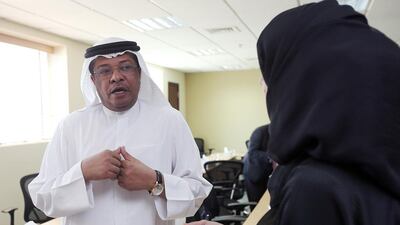DUBAI // FNC members heard conflicting views on Tuesday on the thorny issue of domestic violence and how to tackle it.
Staff at the Dubai Foundation for Women and Children told them a new law was needed to define people’s rights, train the police and give judges the power to deal with offenders.
Afra Al Basti, an FNC member for Dubai and head of the foundation, said a new law was critical. “Violence can end in death. Wadeema was killed as a result of violence that reached that point. We have a problem, we don’t want to wait for other countries to tell us this.”
Wadeema, an Emirati girl who died of abuse at the hands of her father and his girlfriend, spurred the FNC to pass the Child Rights Law.
Ghaneema Al Bahari, the foundation’s care and rehabilitation director, said a law would give the foundation teeth and ensure security officials were trained to deal with such cases.
But officials at the Ministry of Social Affairs said legislation was difficult without a legal definition of domestic abuse.
Conduct that the United Nations or western countries might consider domestic violence could be viewed by an Arab community as family discipline, said Dr Hussain Al Shaikh, assistant undersecretary at the ministry.
Ms Al Basti told ministry officials that domestic violence cases appeared to be on the rise, according to recent local studies.
But the officials, including Naji Al Hai, deputy undersecretary, said such studies could not be considered concrete evidence without a proper definition of violence, which they mostly viewed as physical abuse only.
Other ministry officials said the Ministry of Interior did not have a department dedicated to domestic violence.
Dr Al Shaikh told FNC members the ministry did not deal with such cases, and neither did any Ewa’a shelters for victims of human trafficking.
The only refuge for victims of such violence was the Dubai Foundation for Women and Children, which had noted an increase in cases involving Emiratis.
“Ewa’a centres cannot accept these cases anyway,” Dr Al Shaikh said. “If a wife who is beaten goes to the shelter, the husband can sue them for practising outside their mandate.”
He said that the ministry stepped in to help families only if they were suffering financially, or in ways outside the scope of domestic violence.
Ministers even rejected an idea by FNC members to open an office to investigate domestic violence because they said it was outside their mandate.
Ahmed Al Jarwan (Sharjah) said if the FNC saw a need for a law and believed the penal code was insufficient, then it would propose a federal law.
“But if the penal code is enough currently, then we say it’s enough,” he said. “But at the same time increase awareness programmes to stop this phenomenon.”
Ministry officials said that even if domestic abuse were not widespread, a law governing it would be useful, but urged the FNC to study the matter in depth over several months because of the sensitivity of the issue.
On a visit to the foundation, members were given clearer statistics and reports of real cases showing the prevalence of the problem.
In 2014, the foundation dealt with 1,090 cases of domestic abuse, with 85 cases sheltered within the foundation. Of those who sought refuge, 36 per cent suffered domestic violence.
Badria Al Faresi, programme and research director, said the number of Emiratis suffering was increasing.
She said a domestic violence law was vital to ensure police did not deal with cases based on personal whim, but through proper channels. She said in the past some victims had been turned away.
Ghaneema Al Bahari, care and rehabilitation director, said a law would give the foundation teeth and would ensure all government security officials were trained to deal with such cases.
osalem@thenational.ae

